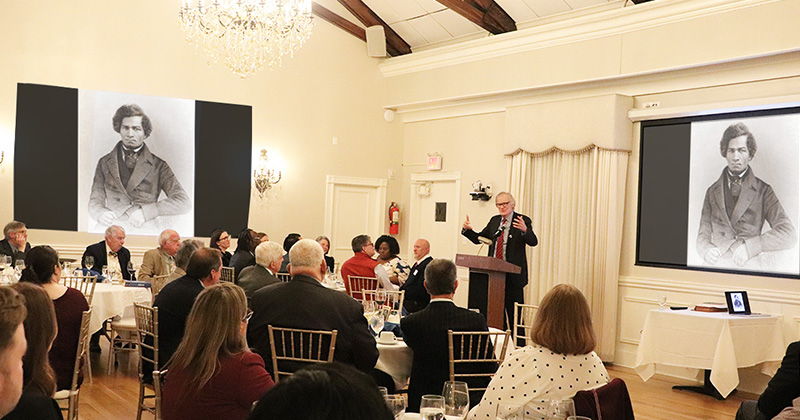
Learning from Frederick Douglass
Historian David W. Blight Speaks at Friends of the UD Library Event
By Allison Ebner
This article also appeared in UDaily.
Born into slavery, abolitionist Frederick Douglass didn’t have a single day of formal education in his life and yet became one of the greatest orators in history, explained historian David W. Blight during the Friends of the University of Delaware Library’s Annual Dinner on April 4.
Surrounded by an audience of UD students, faculty, staff and community members at Wilmington’s University and Whist Club, Blight spoke to how Douglass honed his skills for oration and writing, and how he used those talents to criticize, defend and advocate for the American nation. In his lifetime, Douglass wrote 1,200 pages of autobiography; edited newspapers for nearly two decades; and wrote thousands of speeches.
“Words are core to the story of [Douglass] because he left us so many to read and live with,” said Blight, as he recalled gaining new insights into one of Douglass’ speeches on his train ride to Delaware. “You see new things every time you read them. You can read this man forever – like a Shakespeare, like an Emerson.”
Blight himself is a man of words as the author or editor of a dozen books, including Frederick Douglass: Prophet of Freedom, a biography that has won nine book awards, including the Pulitzer Prize. He was the featured speaker at the annual dinner, which celebrates the Friends of the UD Library’s successful year of programming and membership.
Each year, the Friends host an annual faculty lecture and facilitate contests to encourage students to engage with library materials and build their own collections. The group also supports the acquisition, care and curation of specialized materials in the University’s Special Collections. Since the group’s inception more than 65 years ago, the Friends have donated more than $2.5 million to the Library, Museums and Press. At the dinner, they presented a check for $150,000 to the Library to support the continuation of this important work.
As an author and scholar, Blight is certainly no stranger to libraries. He began his talk by explaining how he considers them precious and sacred spaces, engaging the crowd from the outset and getting audible reactions and affirmations from the audience as he shifted the focus to Douglass’ life and the legacy he left on American democracy.
“To [Douglass], democracy meant ‘I will have nothing that others don’t have, and they will have nothing that I don’t have,’” Blight said to the engaged crowd. “It’s so simple, but so hard. It makes us give up something to get something. It’s figuring out how to work with people you don’t like – people you might even hate, like your slave owner. He hated his slave owner, but he knew what it took to survive that hatred.”
Before and after his talk, Blight signed copies of Frederick Douglass: Prophet of Freedom – many were purchased on site, but several guests brought their own well-worn copies with them. The night closed with a Q&A session that had no shortage of questions from the audience, eager to learn more about the great 19th-century abolitionist.
As Blight emphasized, Douglass’ words continue to live on and impact and influence democracy today. A natural orator, Douglass had to learn the hard way how to write well, but when he honed the art of combining the two, he became an unstoppable force.
“With all of [Douglass’] writing, you’re reading the deepest and most reflective take on what it meant to be a slave,” said Blight. “There was physical ownership, being property, but more important to him was the enslavement of the mind. He was more worried about what slavery could do to his mind, his imagination, his dreams, his ability to think.”
